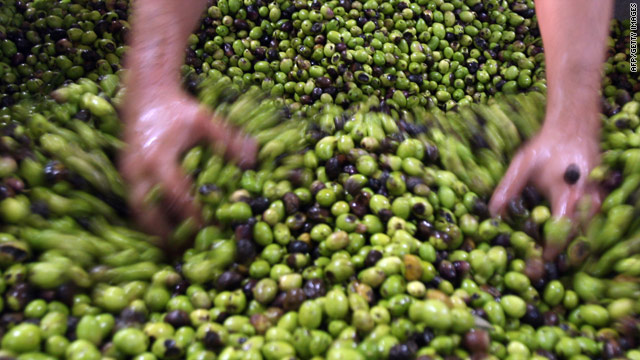The secrets of Marseille's century old soap factory

- Marseille has been producing olive and vegetable oil soap for over a thousand years
- Each year 5000 tons of soap are produced and the soaps are now protected by French law
- The company's recipe is now a coveted item in boutiques across Europe and North America
Marseille, France (CNN) -- Inside a hundred-year-old factory, a man leans over an enormous vat of boiling soap. Steam wafts up to the rafters where decades of soap-making have left a waxy residue. This is the Soap Master at work.
"Some years ago, the soap master was tasting the soap," explains Dany Alcaraz, a third generation soap maker at Savon de Marseille in Southern France. "With tasting, he thinks maybe it's too much salt, or not enough. Is it cooked or not cooked?"
For more than a thousand years, the French city of Marseille has been producing olive and vegetable oil soap. The coveted bars of green and cream soap are protected by French law. Only soap producers using traditional methods within Marseille's city limits can use the name Savon de Marseille.
Dany Alcaraz gave us a tour of her family's historic business. The company's recipe is surprisingly simple and has remained unchanged for centuries: Olive oil, salt water and soda ash boiled for days.
 Video: Chic soap's ancient history
Video: Chic soap's ancient history
The Soap Master used to perch precariously over a steaming cauldron to stir the bubbling soap. The scalding liquid was then poured out onto the factory floor and allowed to set for several more days before being cut into blocks. This is work considered so dangerous that a special shrine was built at the factory site to watch over the workers.
Today, the shrine with a statuette of the Virgin Mary still looks over the workers and the factory floor has ribbons of raw soap left to harden for nearly a century.
But the mixing is now done by machine and the Soap Master monitors the amount of raw material being pumped in, keeping an eye on the temperature.
Each year, Savon de Marseille produces about 5000 tons of vegetable oil soap. Traditionally, the soap was made from pure olive oil producing a soft green-colored soap. French law now allows for palm oil to be used as well, producing a creamy beige soap that is popular with buyers.
--Emilie Lesbros
Vegetable oil soap used to be used for everything from laundry to kitchen cleaning. But with the introduction of more powerful detergents and cleaners, Savon de Marseille lost its popularity.
The company still sells blocks of soap to markets in Africa where it is still used for all-purpose cleaning and sold for about a dollar a block.
But Savon de Marseille's simple, mild recipe is also what makes it such a coveted item in stylish boutiques across Europe and North America. Savon de Marseille's pure vegetable oil soap is naturally hypo-allergenic, perfume and additive free. The company has carved out a niche market selling a kilo block of soap for as much as 15 dollars.
"Because it's natural. It's bio-fashion. Our soaps increased in fashion because everyone wants to wash himself with natural products," explains Emilie Lesbros of Savon de Marseille's Marketing and Development.
In fact, Savon de Marseille makes much of its money by selling "soap noodles" -- small malleable fingers of vegetable soap -- as a raw material to cosmetic companies. That allows retailers to stamp, package and market the soap with their own brand while retaining the "Savon de Marseille" brand.
"Just the shapes of the soaps have changed. Last century, people used the big blocks of soap.
"Now, they use small pieces, more used for the "toilette." But the process of manufacturing has not changed. It has remained the same," says Alcaraz.
